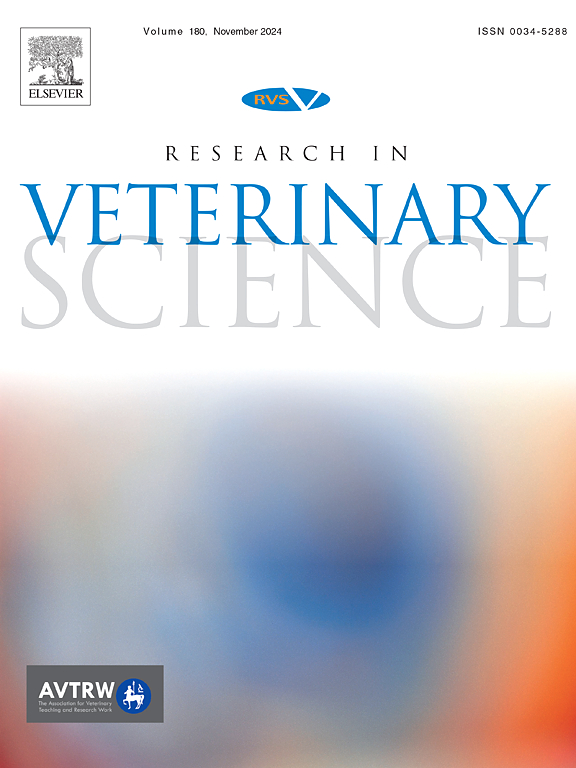Niclosamide modulates chronic Cryptosporidium-induced ileocecal adenocarcinoma in immunocompromised infected mice via targeting IL-6/IL-22-STAT3 axis
IF 1.8
3区 农林科学
Q1 VETERINARY SCIENCES
引用次数: 0
Abstract
Cryptosporidiosis, a protozoal disease caused by Cryptosporidium parvum (C. parvum), is a globally emerging waterborne infection leading to moderate to severe diarrhea, particularly in immunocompromised individuals. Emerging evidence proposes a potential correlation between chronic infection and digestive cancers, though the underlying mechanisms remain unclear. Therapeutic options are minimal, with nitazoxanide (NTZ) being the only drug available, despite its constrained effectiveness. Niclosamide (NICLO), an anthelmintic drug, exhibits antiparasitic properties and modulates oncogenic signaling pathways, making it a promising candidate for dual therapeutic effects. This study investigated NICLO's efficacy against chronic C. parvum infection and its potential to prevent ileocecal adenocarcinoma development in immunocompromised mice. Mice were immunosuppressed using dexamethasone, infected with C. parvum oocysts, and administered NTZ or NICLO. NICLO administration significantly reduced parasite burden by 90 %, restored histopathological alterations, and suppressed C. parvum-induced inflammation, as evidenced by suppressed IL-6 and IL-22 levels and STAT3 activation. NICLO also counteracted the antiapoptotic effects of infection by downregulating Bcl-2 and upregulating Bax and cleaved caspase-3 levels. Moreover, NICLO deactivated the Wnt/β-catenin pathway and its target genes (survivin, c-myc, and cyclin D) while elevating p53 levels. These findings highlight NICLO's dual therapeutic potential, which effectively targets C. parvum infection and mitigates its tumorigenic effects by disrupting key signaling pathways involved in ileocecal cancer progression. This study provides novel insights into NICLO's chemotherapeutic efficacy in managing cryptosporidiosis and its associated oncogenic potential.

奈洛沙胺通过靶向IL-6/IL-22-STAT3轴调控免疫功能低下感染小鼠隐孢子虫诱导的慢性回盲腺癌
隐孢子虫病是由细小隐孢子虫(C. parvum)引起的一种原虫病,是一种全球新出现的水媒感染,可导致中度至重度腹泻,特别是在免疫功能低下的个体中。新出现的证据表明慢性感染和消化系统癌症之间存在潜在的相关性,尽管潜在的机制尚不清楚。治疗选择很少,硝唑胺(nitazoxanide, NTZ)是唯一可用的药物,尽管其有效性有限。Niclosamide (NICLO)是一种驱虫药物,具有抗寄生虫特性和调节致癌信号通路,使其成为具有双重治疗作用的有希望的候选药物。本研究探讨了NICLO对免疫功能低下小鼠慢性细小梭菌感染的疗效及其预防回盲腺癌发展的潜力。小鼠使用地塞米松免疫抑制,感染小虫卵囊,并给予NTZ或NICLO。通过抑制IL-6和IL-22的水平以及STAT3的激活,NICLO显著降低了90%的寄生虫负担,恢复了组织病理学改变,并抑制了C. parvum诱导的炎症。NICLO还通过下调Bcl-2和上调Bax和cleaved caspase-3水平来抵消感染的抗凋亡作用。此外,NICLO使Wnt/β-catenin通路及其靶基因(survivin、c-myc和cyclin D)失活,同时提高p53水平。这些发现突出了NICLO的双重治疗潜力,它可以有效地靶向微小梭状芽胞杆菌感染,并通过破坏参与回盲癌进展的关键信号通路来减轻其致瘤作用。这项研究为NICLO在治疗隐孢子虫病及其相关致癌潜能方面的化疗疗效提供了新的见解。
本文章由计算机程序翻译,如有差异,请以英文原文为准。
求助全文
约1分钟内获得全文
求助全文
来源期刊

Research in veterinary science
农林科学-兽医学
CiteScore
4.40
自引率
4.20%
发文量
312
审稿时长
75 days
期刊介绍:
Research in Veterinary Science is an International multi-disciplinary journal publishing original articles, reviews and short communications of a high scientific and ethical standard in all aspects of veterinary and biomedical research.
The primary aim of the journal is to inform veterinary and biomedical scientists of significant advances in veterinary and related research through prompt publication and dissemination. Secondly, the journal aims to provide a general multi-disciplinary forum for discussion and debate of news and issues concerning veterinary science. Thirdly, to promote the dissemination of knowledge to a broader range of professions, globally.
High quality papers on all species of animals are considered, particularly those considered to be of high scientific importance and originality, and with interdisciplinary interest. The journal encourages papers providing results that have clear implications for understanding disease pathogenesis and for the development of control measures or treatments, as well as those dealing with a comparative biomedical approach, which represents a substantial improvement to animal and human health.
Studies without a robust scientific hypothesis or that are preliminary, or of weak originality, as well as negative results, are not appropriate for the journal. Furthermore, observational approaches, case studies or field reports lacking an advancement in general knowledge do not fall within the scope of the journal.
 求助内容:
求助内容: 应助结果提醒方式:
应助结果提醒方式:


